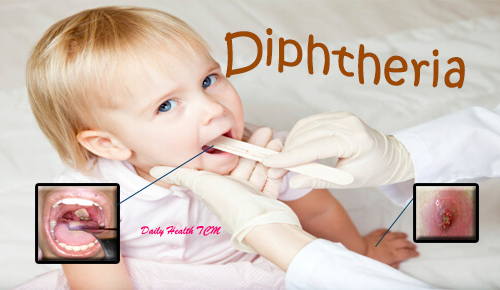Diphtheria bacteria will produce toxins that kill cells in the throat. Cells that die will form gray membrane in the throat. In addition, the toxin can spread through the blood and attacks the heart and nervous system.
People who have received vaccinations can still be infected with the disease. But they usually do not show symptoms while being infected. But you have to remain vigilant because they can transmit diphtheria.Diphtheria mucous membranes of the nose and throat and can sometimes affect the skin. The disease is highly contagious and including serious infections that can be life threatening if not treated immediately.
Diphtheria is caused by two types of bacteria, namely Corynebacterium diphtheriae and Corynebacterium ulcerans. The incubation period (when the bacteria enter the body until symptoms appear) disease is generally two to five days. The symptoms indicating this disease include:
- A gray membrane covering the throat and tonsils.
- Fever and chills.
- Sore throat and hoarseness.
- Difficulty breathing or rapid breathing.
- Swelling of the lymph glands in the neck.
- Limp and tired.
- A runny nose. Initially molten, but eventually becomes thick and sometimes bloody.
Diphtheria also sometimes can attack the skin and cause ulcers. The sores will heal in a few months, but usually will leave scars on the skin.
Causes of Diphtheria
The spread of diphtheria bacteria can occur easily and the main one is through the air when a patient sneezes or coughs. In addition, there are some other transmission method that needs to be watched. Including through:
- Items that have been contaminated by bacteria, such as toys or towels.
- Direct contact with animals already infected, such as cows.
- Drinking milk that has not been through the process of pasteurization or sterilization.
- Foods made from milk that has not been through the process of pasteurization or sterilization.
- Touch directly on the boil due to diphtheria in the skin of patients. This transmission usually occurs in people who live in densely populated environment and hygiene is not maintained.
Diphtheria bacteria will produce toxins that kill cells in the throat. Cells that die will form gray membrane in the throat. In addition, the toxin can spread through the blood and attacks the heart and nervous system.
People who have received vaccinations can still be infected with the disease. But they usually do not show symptoms while being infected. But you have to remain vigilant because they can transmit diphtheria.
Complications Diphtheria
Treatment of diphtheria should be done to prevent the spread of serious complications at the same time, especially those with children. It is estimated that nearly one in five people with diphtheria and toddlers aged over 40 years who died due to complications.
If not treated quickly and appropriately, diphtheria toxin from the bacteria could spark some life-threatening complications. Some include:
- Respiratory problems. Cells that die from diphtheria toxin produced by the bacteria will form a gray membrane which can block breathing. The particles also can shed membrane and into the lungs. This could potentially lead to inflammation in the lungs that function will decrease drastically and cause respiratory failure.
- Heart damage. In addition to the lungs, potentially diphtheria toxin into the heart and cause inflammation of the heart muscle or myocarditis. These complications can cause problems, such as irregular heartbeat, heart failure and sudden death.
- Nerve damage. The toxin can cause the patient to experience difficulty in swallowing problems, urinary tract problems, paralysis or paralysis of the diaphragm, as well as nerve swelling of hands and feet. Urinary tract problems can be an early indication of nerve palsy which affects diaphragms. This paralysis will make the patient can not breathe and thus require a ventilator or respirator. Diagfragma paralysis can occur suddenly in the early symptoms or weeks after infection healed.

